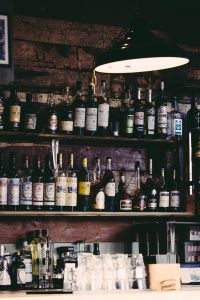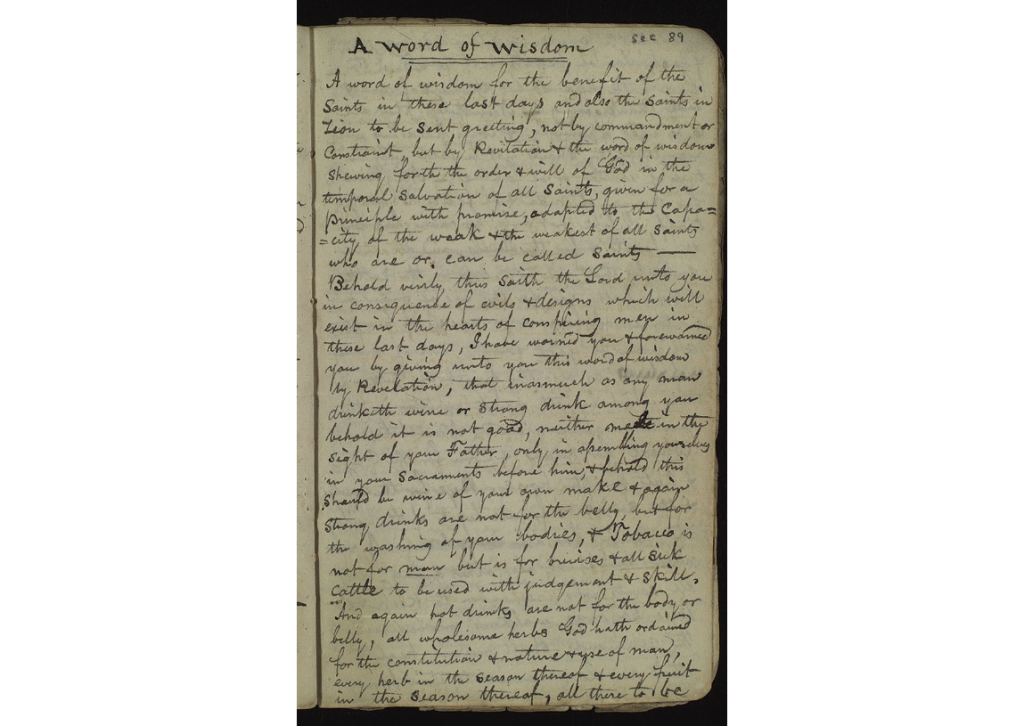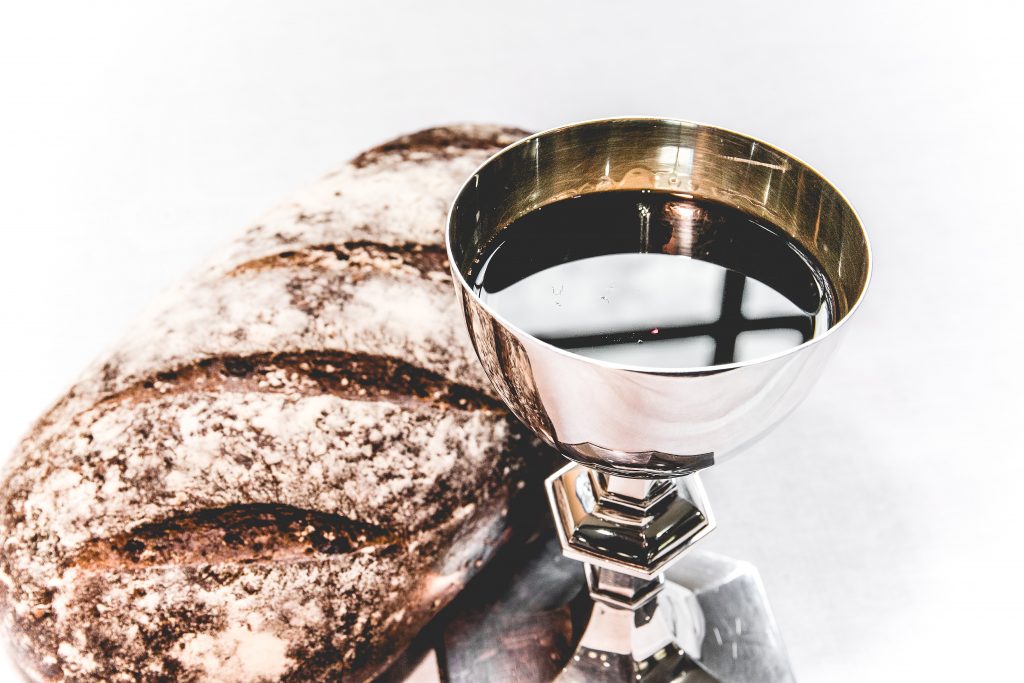Did Joseph Smith obey the Word of Wisdom?
 Whiskey, whiskey, whiskey
Whiskey, whiskey, whiskey
Joseph Smith stood before the saints in Nauvoo, Illinois in April 1841 and, with good humor, said: “What are my temptations? Whiskey whiskey whiskey.” He said he “could live on it and get fat and feel well if God did not say it was sinful. He would not wrestle with it,” Joseph continued, “for he could not throw it.” Some people consider Joseph’s occasional consumption of alcoholic beverages hypocritical. Was it?
Joseph drank before the Word of Wisdom was revealed
Martin Harris testified that Joseph “drank too much liquor” sometimes before he translated the Book of Mormon. The source for that is Joseph’s published history, so he didn’t try to hide it. Most of the other evidence that Joseph drank before the Word of Wisdom comes from critics, including a statement by Barton Stafford that “Joseph Smith, Sen. was a noted drunkard and most of the family followed his example, and Joseph, Jr. especially, who was very much addicted to intemperance.” But Joseph wasn’t very addicted. He wasn’t even a little addicted.
Barton was grinding an ax against Joseph. Orlando Saunders is a less hostile, more credible witness. He said “everybody drank in those days,” including the Smith family. “But,” he added, “they never got drunk.” Actually, Joseph’s dad said in 1834 that he had been drunk in the past, but Saunders and scholar Richard Bushman agree that “Joseph Sr.’s drinking was not excessive for that time and place.” It would have been odd if Joseph didn’t drink. It was common, and not yet forbidden by the Lord. Maligning Joseph for drinking before the Word of Wisdom is silly and mean.
Joseph also drank after the word of wisdom was revealed in 1833
His journals are sprinkled with the evidence of occasions on which he drank. There is a pattern. After performing the marriage of a couple in January 1836, Joseph joined the wedding party as they “partook of refreshments, and our hearts were made glad with the fruit of the vine.” Speaking of the New Testament account of Christ furnishing a wedding party with wine, Joseph added playfully, “this is according to pattern set by our Savior himself and we feel disposed to patronize all the institutions of heaven.”
To Joseph, these were sacramental occasions. He drank wine at weddings in keeping with the Word of Wisdom’s counsel to drink it “only in assembling yourselves together to offer up your sacraments before him. And, behold, this should be wine, yea, pure wine of the grape of the vine, of your own make” (D&C 89:5-6). The wine Joseph drank on these occasions had alcohol in it. It wasn’t just grape juice. Pasteurization was still half a century in the future. Originally, the Word of Wisdom approved, not condemned, specific, moderate drinking of sacramental wine.
A week after the marriage mentioned above, Joseph officiated in another “matrimonial occasion,” as his journal described it. Afterward groomsmen supplied wine. Joseph said he “cheerfully” blessed it, and the wine “was then passed around in order, then the cake in the same order. Suffice it to say our hearts were made glad, while partaking of the bounty of the earth which was presented until we had taken our fill. Joy filled every bosom,” His journal entry says, “I doubt whether the pages of history can boast of a more splendid and innocent wedding and feast than this. For it was conducted after the order of heaven.”

Not all of Joseph's drinking was sacramental
Joseph also drank wine in sacramental settings in the Kirtland temple, but not all of the occasions on which he drank were sacramental. Joseph apparently had some whiskey while confined in jail at Liberty, Missouri in the winter of 1838-1839. His journal entry for May 3, 1843 notes that Jenetta Richards, a recent immigrant from England, visited his office with a bottle of wine her mother made in England. Joseph’s journal says he “drank a glass of wine with her.”
A month before his death, according to his journal, Joseph visited Frederick Moesser’s grocery store and “drank a glass of beer.” Originally, the Word of Wisdom approved mild barley drinks like the one Joseph had that day. On the last day of his life, confined in jail at Carthage, Illinois, solemn and conscious that he was about to meet his Maker, Joseph and his associates drank wine. John Taylor, an apostle who was with Joseph, noted later that this was not a sacramental occasion. “Our spirits were generally dull and heavy,” Taylor said, “and it was sent for to revive us,” the way saints today might have a coke in the afternoon. Taylor said all four men in the jail “drank of the wine, and gave some to one or two of the prison guards.”
Those are the facts. You get to decide what they mean. Some people who are antagonistic toward Joseph, or just not well informed, decide the facts mean that Joseph Smith did not live the Word of Wisdom. That conclusion is anachronistic, or out of historical order. It assumes that observing the Word of Wisdom meant the same thing then that it does now. But it didn’t.
What it means to obey the word of wisdom has changed over time
The revelation was originally given “not by commandment.” Joseph knew it well and observed it consciously, just not always meticulously, the way we might. He called excessive drinking a “monster,” and “the bane of humanity.” He “never interpreted the revelation as demanding total abstinence, but stressed moderation and self-control.” Joseph urged intemperate saints to be temperate and teetotaling ones to be tolerant.
 Joseph might find it odd but not unexpected that critics devour the evidence he left us that once in a while he had a beer or drank a glass of homemade wine or enjoyed sacramental wine, or that he was tempted by whiskey, or that he drank some while he was unjustly imprisoned in a depressing dungeon. He might be puzzled that some people have focused inordinate attention on prosecuting him while overlooking the prophetic Word of Wisdom he produced. “I never told you I was perfect,” Joseph said, “but there is no error in the revelations which I have taught.” It is not hard to find faults Joseph did not try to hide, but where are the flaws in his revelation known as the Word of Wisdom?
Joseph might find it odd but not unexpected that critics devour the evidence he left us that once in a while he had a beer or drank a glass of homemade wine or enjoyed sacramental wine, or that he was tempted by whiskey, or that he drank some while he was unjustly imprisoned in a depressing dungeon. He might be puzzled that some people have focused inordinate attention on prosecuting him while overlooking the prophetic Word of Wisdom he produced. “I never told you I was perfect,” Joseph said, “but there is no error in the revelations which I have taught.” It is not hard to find faults Joseph did not try to hide, but where are the flaws in his revelation known as the Word of Wisdom?
Author: Steven Harper
I’m an introvert with an advocate personality. So I was pretty reserved in grad school seminars until a fellow student went off about how people shouldn’t have kids, and I launched into a lecture about how I’m the seventh of ten children of really great parents. My parents made sure the scriptures were read early and often in their home, but it was up to me to decide whether I would love the scriptures. I learned that the Book of Mormon is true shortly before I served in the Canada Winnipeg Mission. But It took me awhile to learn to love the scriptures. Not until I was teaching Dora, a Lutheran woman in her sixties, did I really want to know what they said and meant. That desire didn’t leave when I returned to BYU, so I changed my major from engineering to ancient near eastern studies and started a series of courses in Biblical Hebrew. I learned that the Bible was way more complicated than I had thought, and I doubted I could master the complexity. When I took a course on early Church history I decided I had to master that, so I switched my major and set my sights on a PhD in early American history. Along the way I wrote an MA thesis about who joined the Church in the 1830s and why. I wrote my dissertation on a little-known 1737 fraud by which the sons of William Penn evicted the Lenape Indians from their homeland. I started teaching in the history and religion departments at BYU-Hawaii, then in 2002 got the chance to join the Religious Education faculty at BYU in Provo and become an editor of The Joseph Smith Papers. That combo was enticement enough to leave Hawaii, where I thought I would miss the land but ended up missing the people. A decade later I taught the Bible (go figure) to great students at the BYU Jerusalem Center for Near Eastern Studies. Before that I had been serving on committees tasked by the Church Historian and Recorder with planning a new history of the Church. When I got home from Jerusalem I was invited to join the Church History Department in Salt Lake City to be the managing historian of that project. For the next six years it was my humbling privilege to work with devoted and talented people to produce Saints: The Story of the Church of Jesus Christ in the Latter Days. More than one million people are reading it online and more than 400,000 print copies have been sold. In 2018 I got my other dream job back: professor of Church history and doctrine at BYU. I was also named the editor of BYU Studies, where I had formative experience as a student intern a long time ago. The best thing about me is my wife and children, but they forbade me to say much about them here. Hannah Salvesen is my daughter, and I’ll share lots of links to the great stuff she produces. Thanks to Hannah and Scott Salvesen for building this site and advising me patiently about all things related to the world wide web. View all posts by Steven Harper

Thank you for this, I have definitely wondered what the truth is when it comes to Joseph Smith’s alleged drinking habits. I really appreciate how you lay out the facts, and let readers discern for themselves what they mean.